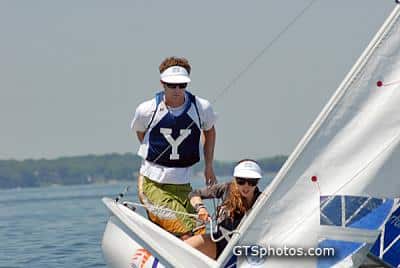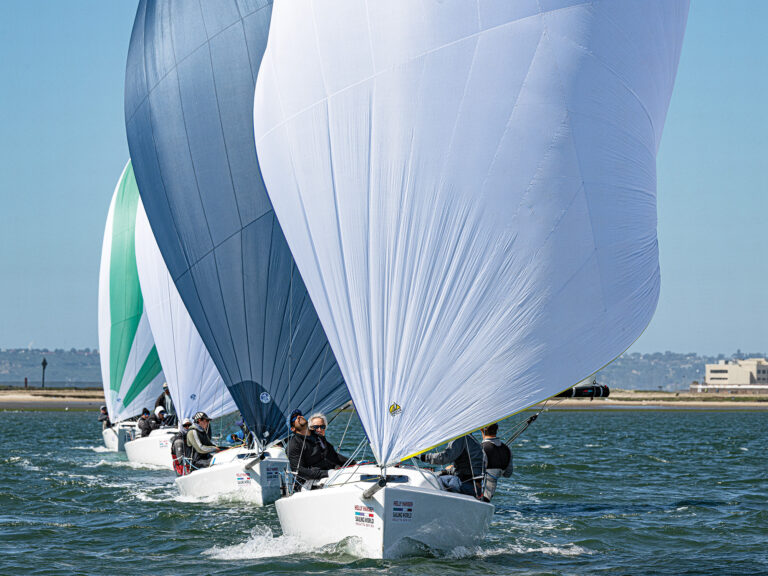
Giving His All
College Sailor of the Year Thomas Barrows (St. Thomas, USVI) went headlong into the 2009-2010 season committed to winning. This mindset didn’t always come naturally for Barrows, a graduating senior and captain of the Yale University Elis. After recognizing his tendency to give less than a full effort at regattas during his junior year, Barrows turned his weakness into strength. Prepared to compete every time he stepped into the boat, Barrows excelled and now intends to transfer his winning attitude to an Olympic Laser campaign.
What made this year so successful?
At every regatta I made sure I was ready to compete to win. To do that, I made sure that I was focused at all times. It sounds pretty simple. It’s true in practice [too], you’re always trying really hard. Which I think at times, and in my previous years in college sailing, you tend to go through the motions because you’re racing every weekend. You get a little passive and are not at 100 percent.
How did you change your attitude to get to 100 percent?
It was pretty gradual. My freshman year, I didn’t really get to sail much during the fall, and then I got to sail B division all spring. As a freshman, that was really exciting, and I was learning a lot so it was really easy for me to stay focused and energetic. In my junior year I started sailing A division for the first time and had a new crew, so I spent a lot of the year just getting comfortable and focused on improving. But, I noticed I was only doing well at the big events. I wasn’t doing that well in the common intersectional weekends. It was something my coaches, Zach [Leonard], Bill [Healy], and I talked about: trying to focus. If I didn’t feel as though I was going to be 100 percent on a weekend, then I probably just shouldn’t go. It didn’t turn out that I took a lot of weekends off; it was more that I really made sure that I was ready to compete. After coming close to winning nationals and with the same fleet race team returning, our team mindset coming into the 2009-’10 season shifted more towards how we could sail smarter regattas that would put us in a position to win every weekend. For instance, before any patterns would emerge on the racecourse we would make a conscious effort to take as few risks as possible by starting in the middle and making smart percentage tactical decisions.
Was there one regatta that you were most proud of?
I’d say they were all pretty much on equal par. The one that really helped set the tone for the whole season was the first regatta, the Harry Anderson at Yale. Our team hadn’t won it since the early 1990s, which seems sort of silly. It’s the first intersectional of the year, so I think it’s pretty easy to take a laidback approach. But from the start, we were really committed to winning, and we ended up winning. Coming prepared to win had mostly to do with our change in attitude. In addition to constantly working on improving our skills, our team was a lot more open about our desire to try to win every single weekend. The Harry A’s is not only the first big intersectional of the year, but it is also our only home regatta, so we felt extra pressure to meet the expectations of sailing well at home and also to prove to ourselves we had the chance to win every weekend. Winning the regatta gave us a lot of confidence for the rest of the season.
You’ve sailed singlehanded events, coed events and team racing events. How do those mesh together?
Team racing helps you hone your boathandling skills, helps you have a better understanding of the rules but also helps break up fleet racing. Team racing can be a lot more fun and exciting. It really keeps you going and gets you more enthusiastic during college sailing because, it’s not boring, but it can get a little simple in fleet racing sometimes. So it’s nice to change it up while fleet racing. It’s something I’ve tried to do in the summers a lot as well as Laser sailing.
**Had you thought much about getting College Sailor of the Year? **
I had thought about it a little bit, but I didn’t really ever envision myself as being the College Sailor of the Year just because, from an outside perspective, and in previous years, it didn’t seem, I wouldn’t say unrealistic, but it’s never really your goal. At the same time, it’s sort of counterintuitive. As a team sport, you feel selfish about thinking about these individual awards, but at the same time, if you win these individual awards, obviously you’re doing something to help the team, so that’s a trick about it.
You definitely seemed thankful during the awards.
As a freshman, I was lucky enough to have an upperclassman as a crew, Abby Coplin. That was huge for me. I was able to really get into the boathandling. Obviously, at times, the skipper gets a little more credit, but as everyone knows you can’t do it without the crew… that was huge. With Zach [Leonard], I was just thankful because not only has he helped me on the water, but also off the water. He’s been a huge help for me all four years of college. I’m just thankful that he helped recruit me and helped give me this opportunity to have a great college experience at Yale, which I’ve really enjoyed. I was able to learn a lot from the coaching and all of the other sailors that have been on the team. A lot of it also has to do with the sailing conditions on Long Island Sound that we get to sail in everyday. The program here has a good mix of a lot things that helped me do well in college sailing.
If you could pinpoint three of the most important things you learned, what would they be?
Due to there being a wide variety of conditions in college sailing, you quickly learn no one is going to be the very best in every type of condition. In addition to taking the clear-cut approach of trying to improve in your weakest conditions and continuing to build on your strengths, I learned how to handle myself better in conditions that were not to my favor. When I was slow relative to other competitors, it is typical of most sailors to make more irrational decisions and take greater risks. By the end of four years, I definitely learned how to better control my frustrations and insecurities and not let them negatively affect my decision-making process.
Secondly, with no drops in college sailing, consistency is even more paramount than it is in most sailboat racing. So I definitely learned how to become a more consistent sailor by becoming better at recognizing when and when not to take risks. For instance, when it’s better to start at an end of the line or sail far to one side of the course.
I also learned a lot about how to make transitions into different wind velocities and new wind angles.
And you’re going back to coach at Yale now?
Yeah; I’m really looking forward to it. It’s a good way to give back to the program, and it’s also going to be beneficial to my own sailing as well. I get to prepare all of the singlehanded sailors for qualifiers and hopefully nationals. It will be good in that sense.
What will you emphasize there?
When I coach now, I really make an effort to understand how the sailors are thinking about what is going on. I feel as though this allows the sailors to be more comfortable communicating with me and makes the process more collaborative.
What sailing are you doing now?
I’m doing a Laser campaign for the 2012 Olympics representing the Virgin Islands.
Where will you train for that?
I’m going to be based up in New Haven this year because I’m coaching at Yale, but I’m going to be all over the place this summer. I’m going to Puerto Rico for a couple of weeks to train, and then I’m going to be in England for pretty much all of August. Worlds are on Hayling Island, which is right next to England. I’m traveling all over.
How does your college sailing experience transfer over to your Olympic goals?
[I’ve learned that] when you’re practicing and training to try to focus on specific skill sets at certain times to get better at certain things. Practicing better has been huge. I grew up sailing in the Virgin Islands with a few other really good sailors, Cy Thompson and Taylor Canfield. We were all the same age and of similar skill level, which meant we did not have an older, more talented group of sailors to learn from. In one sense, it was a blessing because we learned how to coach ourselves. Since we were super competitive, we pushed one another really hard. On the other hand, it fostered some bad training behaviors. Every time we trained, we were attached to our egos, which meant we got too worked up with emotions and did not always look to one another to improve. College made me a lot more humble in my approach to sailing, which allowed me to be better at soaking in new techniques and tactics from sailors and coaches. It really opened my eyes to how collaborative sailors needed to be with each other and their coaches to be the most efficient at improving. I think that helps me a lot: being able to teach yourself how to learn as best as possible and being able to improve.
What did you do after Nationals?
Actually, I came back to New Haven and helped run a reunion reception for the Yale Corinthian Yacht Club.









